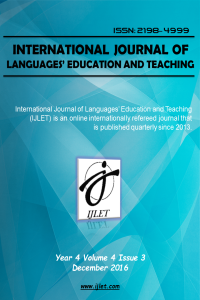Öz
Kaynakça
- Wenger, E., & Trayner. (n.d.). Introduction to communities of practice, from http://wenger-trayner.com/introduction-to-communities-of-practice/ Wenger, E., White, N., & Smith, J. D. (2009). Digital habitats: Stewarding technology for communities. Portland, OR: CPsquare. Yin, R. K. (2014). Case study research: Design and methods. Thousand Oaks, CA: Sage.
FACTORS AFFECTING ENGLISH AS A FOREIGN LANGUAGE TEACHERS’ PARTICIPATION IN ONLINE COMMUNITIES OF PRACTICE: THE CASE OF WEBHEADS IN ACTION
Öz
An online community of practice (OCoP) is a group of people, who are brought together by a shared interest and with the aim of deepening their understanding of an area of knowledge through regular interactions facilitated by computer mediated communication (CMC) tools. An OCoP can potentially provides teachers with those elements of effective professional development (PD), cited in the literature, such as; collaboration, opportunities for mentoring, and sustainability over time. In this sense, OCoPs can be considered as a viable alternative for teacher PD. If OCoPs are to become an alternative approach to teacher PD then it is important to understand what factors affect teachers’ participation in such communities. Therefore, through the case of Webheads in Action (WiA) OCoP, this study aimed to identify what factors contribute towards creating successful OCoPs. Members’ interactions in WiA’s public group page were collated over a period of nine months and interviews with 24 members of the community (4 core, 9 active, 11 peripheral) were used to gather the data. Two major themes emerged in relation to factors affecting members’ participation in this OCoP. The first one was identified as the creation of a sense of belonging to the community which was achieved through various means such as having an initiation process and fostering trust and an inclusive community environment through community norms. The second was dynamism inherent in the community which manifested itself as new topics that kept members interested and participating, and a flow of continuous member recruitment to the community. In conclusion, this study highlighted the importance of the socio-affective dimension for designing and sustaining OCoPs.
Anahtar Kelimeler
English as a foreign language (EFL) online community of practice (OCoP) teacher professional development.
Kaynakça
- Wenger, E., & Trayner. (n.d.). Introduction to communities of practice, from http://wenger-trayner.com/introduction-to-communities-of-practice/ Wenger, E., White, N., & Smith, J. D. (2009). Digital habitats: Stewarding technology for communities. Portland, OR: CPsquare. Yin, R. K. (2014). Case study research: Design and methods. Thousand Oaks, CA: Sage.
Ayrıntılar
| Birincil Dil | İngilizce |
|---|---|
| Konular | İkinci Bir Dil Olarak İngilizce |
| Bölüm | Araştırma Makalesi |
| Yazarlar | |
| Yayımlanma Tarihi | 30 Aralık 2016 |
| Yayımlandığı Sayı | Yıl 2016 Cilt: 4 Sayı: 3 |


